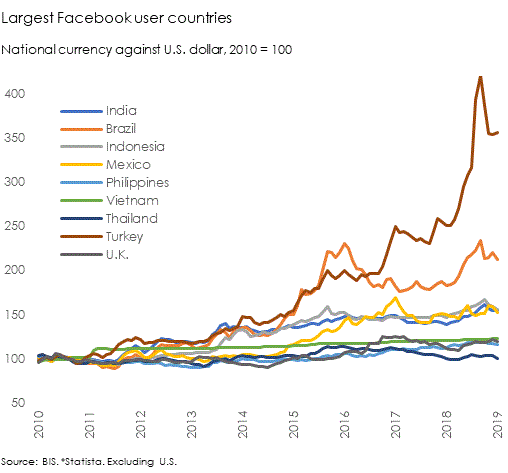Are social networks optimum currency areas?
7 April 2019
The recent emergence of private digital currencies, like bitcoin, has been met with considerable criticism. Yet, recent rumours that a large social network may issue a digital currency seem to affirm that new types of currencies are in demand. A social network digital coin could propel the notion of private currencies to new levels. Economic theory seems supportive of the idea. Adoption of a social network coin would rest in large part on whether a social network would constitute an optimum currency area. If so, it could change the very architecture of money.
Most monies are already private. Money is normally a liability of private banks. Currency is only a small subset of money and issued by the official sector typically the central bank. Goods and services including critical services like life and health insurance are often private. Private currencies, in theory though not in practice, should be as adequate as other private goods and services. They could e.g. serve large international commercial networks or offer a reach national currencies cannot. A social network coin seems to make sense.
Several possible types of social network coins could exist. It is assumed here that a social network coin would be used to denominate all goods and services offered on the social network. The social network would become a single currency area.
The rationale of a social network coin would be to internalise transaction costs and maximise economic integration of network users. It would eliminate currency risk, increase price transparency and possibly competition as prices would be more comparable. The main disadvantage is that network users would face the risk of revaluation against their home country currencies that may impair their ability to participate economically in the network.
The optimum currency area theory would suggest that a social network constitutes an optimum currency area if network users are better off sharing a common currency than floating against one another through their national currencies. The theory emerged during the 1960s—and often contested today in its original formulation—to offer insights to analyse if countries should fix or float their currencies. The principal arguments rest on the idea that a region would constitute an optimum currency area if a currency depreciation would help reduce unemployment without causing undue high inflation in other parts of the region. The problem is that currency areas are normally countries where the criteria for forming a currency area is subordinated to the national territory. A social network could form a currency area independently of a given country.
Taking Facebook as an example, in January 2019, Facebook had 2,400 million active monthly users and was present in 10 countries with more than 40 million users each according to Statista. The numbers suggest that Facebook is bigger than any country.
Facebook users may be differently affected by fluctuations of the network coin against their national currencies. If say Facebook users in India, the country with the largest number of active users and Facebook users in the U.S., the country with the second largest number of active users, were to share a common currency, fluctuations vis-à-vis their national currencies would naturally affect their purchasing power on the network. During the past 12 months the Indian rupee depreciated against the dollar through October 2018 by 15 percent and since appreciated by 8 percent. If Indian users held balances in Facebook coins they would not have been affected by the depreciation. Similarly, if the Indian rupee had depreciated against the Facebook coin, Indian users would see their ability to acquire Facebook services diminished. At the same time, the services offered by U.S. users, seeing their currency appreciate against the network coin, could become uncompetitive. Considerations may be given to adopt compensatory measure to share the burden from network coin fluctuations. Credit mechanisms may also be contemplated to help network users adjust to large shocks without incurring measures that would be destructive for the entire network.
Figure. Facebook users national currency fluctuations

National currency fluctuations of Facebook users suggest that Facebook constitutes a highly economically heterogenous area. Of the 10 largest Facebook user countries including India, Brazil, Indonesia, Mexico, Philippines, Vietnam, Thailand, Turkey and the U.K. and excluding the U.S., between January 2010-January 2019, 4 countries have seen their national currencies depreciate by 10-20 percent against the dollar, 3 by 50-60 percent, 1 by 210 percent and 1 by 360 percent with the weighted average, by number of Facebook users, being 60 percent (Figure 1). Large social networks may therefore better settle rather than for a single coin for a more differentiated approach. Euro Area social network users will know what the travails of a single currency can be.